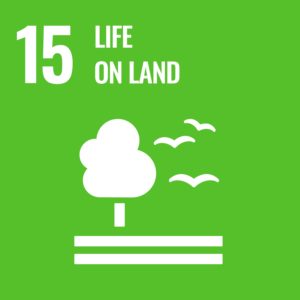SDG15: Life on Land
The University of Northampton understands that biodiversity is the foundation of a healthy planet and our commitment to biodiversity extends far beyond the walls of our campus. We believe that promoting sustainable land management practices and ensuring our environment is ecologically rich, is not only our responsibility but also a vital part of our educational mission.
The ecological needs of our site are at the forefront of all our land management practices, our sustainable methods of management aim to increase and sustain biodiversity and create suitable habitats for an array of flora, fauna and wildlife.
The UON have also joined a global alliance of universities, making the protection and enhancement of the natural world a priority by pledging to be a ‘Nature Positive University’. More information on this and biodiversity across our estate can be found on the Environment and Sustainability Ecology webpage.

Education, Outreach and Events
We are committed to providing our students and local community with the opportunity to learn about our ecosystems on campus by providing practical experience for our academic courses and outreach activities to support social impact.
Events and Outreach
Recent events have included Willow Weaving Workshops and Community Litter Picking Activities. Our Willow Weaving Workshops enable our students to learn the practicalities of coppicing the 8 types of willow tree we have on campus and how they can be identified by the colour of their stem. Once coppiced, the willow stems are used in a free workshop to teach staff and students how to weave and create a variety of decorations waste free.
In 2019 many staff, students and members of the local community volunteered to take part in a Community Litter Pick across the areas surrounding our campus. The aim of the activity was to benefit our local community by keeping the area tidy, creating social interaction to support wellbeing, and to promote the importance of correct waste disposal when ensuring sustainable use of land.
Throughout the year UON hold many events and awareness campaigns, with the aim to encourage and support positive behaviour change, for happy communities and a happy planet. These events and activities take place in conjunction with Sustainability Champion projects and our Halls H.E.R.O.E.S campaign, where our pursuits cover many ecological topics from bird spotting, butterfly surveys, flower bomb making and teachings on sustainable land management practices.
More information on events led and supported by the Environment and Sustainability team can be found on the Sustainability Team webpages under the ‘Current and previous Sustainable Development events’ tab.
Education
We believe that learning about biodiversity is essential, which is why we incorporate biodiversity studies into our curriculum. Our students have the opportunity to conduct research and engage in hands-on learning experiences.
Listed below are the courses we deliver covering ecology and biodiversity within modules that encompass sustainable land management for eco systems including Flora and Fauna.
You can follow our environmental science students on twitter @EnvSciUON which offers an insight into the programmes currently and previously being facilitated by their team to raise aware of environmental change and promote sustainability.
Visitors to Northampton can follow the Northampton Town Centre Walking Tour this is a tourist trail available for visitors to Northampton to familiarise themselves with the campus and town centre locations.
Sustainable tourism is a topic covered in the academic courses we deliver listed below:
- Biological Sciences BSc (Hons)
- Hospitality Management BA (Hons)
- International Tourism Development MA
Please check out our latest research for SDG15: Life on Land